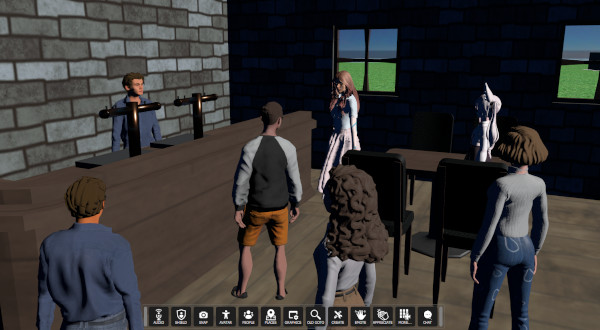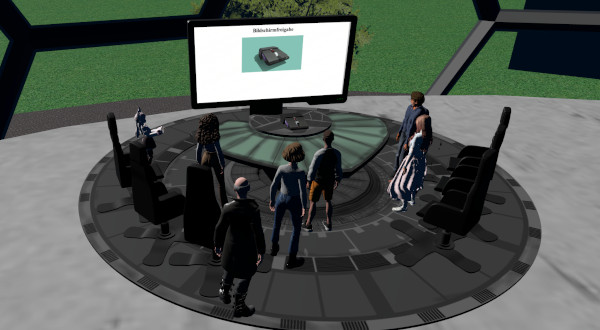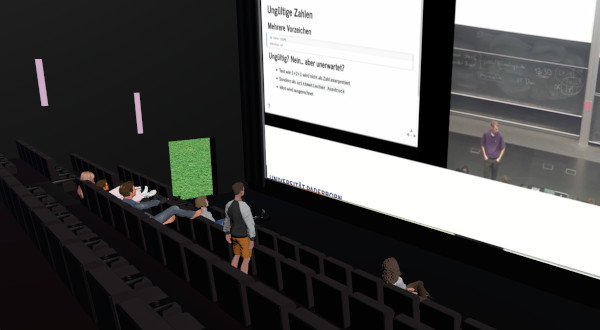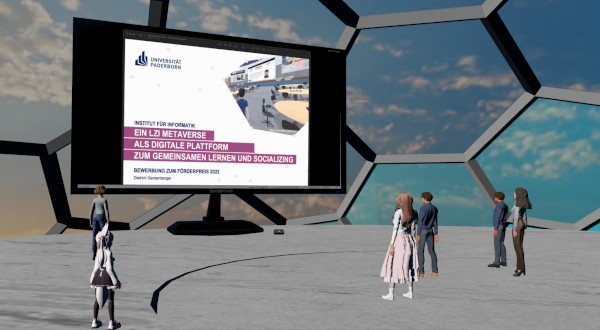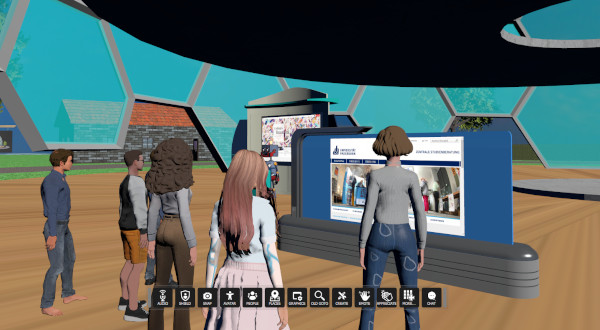The LZI Metaverse
A digital world for collaborative learning, teaching support, extracurricular offerings, and socializing in computer science studies.
Initial situation
The Study Center for Computer Science (LZI) at UPB has been supporting you since 2012. In its rooms you can meet like-minded people to work and learn together and we try to offer you a wide range of services to help you start your studies and stay motivated until the end.
With the first lock-down, the doors suddenly had to remain closed and an attempt was made to digitize the previous offerings. All information about the LZI offers was transferred from the usual posters to a new PANDA course. The consultation hours of the tutors could be transferred to online sessions, but the technology did not play along at that time and the usual quality of the consultation hours could certainly not be achieved. However, the use case of spontaneously going to the LZI to connect with fellow students who were also working on the exercise sheets or trying to explain new course topics to each other was devastating. In general, going to locations to interact with fellow students completely disappeared.
Returning to face-to-face classes also did not go quite as expected. Many had retreated to their home offices outside of Paderborn, and some saw advantages in no longer having to travel to PB every day or live locally. For the most part, our faculty have maintained their additional digital offerings, so it is still possible to complete one's studies largely as a distance learning program. But places of presence, such as the learning center as a meeting place for joint work, remain out of reach.
Project and objectives
Against this background, the development and testing of an LZI Metaverse is planned. The aim of the project is to test the metaverse technology for use in learning scenarios and thus contribute to improving the quality of teaching. In addition to the face-to-face learning center, the LZI Metaverse will provide a platform to get in touch with like-minded people without being tied to a specific location and to stay in touch with them around the clock. Like presence learning sites, people can meet in groups to collaborate with them in an environment similar to the presence learning center. In the future, the Metaverse will become a virtual meeting place for projects and tasks in a university context.
A feasibility analysis has identified the open source platform Vircadia as a promising candidate. Data protection is met, as this platform can be operated on a self-hosted server and is only accessible in the university network (from home via the university VPN).
The planned Metaverse features
The virtual world must allow students to casually walk around among other visitors and talk to everyone present without technical complications. There will be various meeting places where you can look for like-minded people or name your fellow students to meet there. It is important to be able to talk freely in closed groups, and to have spaces that are accessible to all and encourage open exchange.
In addition to the pure meeting places, there should be many spaces in the virtual world where screens are available that can be used for screen sharing. Learning groups can meet there and work together on assignments and discuss their notes. Audio chat and screen sharing allow for the implementation of a variety of learning settings. In this way, the learning environment provided to students by a classroom setting can be replicated in many ways. In this way, it is also possible to solve individual problems in community in a digital setting.
In various cinemas, theaters, etc., students can meet and watch the available online recordings of their courses. Technically, it's conceivable that students could gather in common locations, then watch their 'own' videos, and later just get back into the conversation. Or they could all watch the same recording synchronously in the virtual hall. In contrast to watching the video at home, the virtual cinema room then provides the opportunity to discuss the specific subject matter and to make in-depth material on the corresponding topic permanently available. Previous events can also be viewed digitally in this setting in the community with like-minded people.
Virtual stages with the option of screen sharing can be used, for courses in the Metaverse, for example. However, they also provide a framework for online events of the learning center and for presentations of working-groups of all departments. Likewise, learning communities could use these stages for their joint work or students could try out their own presentations in front of fellow students.
Information stands can be used, for example, to present the entire range of services offered by the learning center. Here, the schedules of the current office hours are made available, the dates of the next LZI events are announced, but also all other forms of announcements are visualized. Other departments, the Central Student Advisory Service or the International Office could place information booths here or offer such services in their own metaverses.
The virtual worlds can theoretically offer countless meeting points. In addition to the learning center, the student council, the various student groups or the central student advisory service (ZSB) could also set up their own points of contact. Via links within the individual metaverse instances, users can intuitively (e.g. by passing through a door) switch from the LZI's offer to other metaverse instances. Individual contacts in the university context are thus easily linked and quickly accessible.
Evaluation
For the evaluation of this new platform it is important to find out how it is accepted and used by the students. Furthermore, the conditions for success within the virtual learning settings should be analyzed in order to contribute to research in higher education didactics.
On the one hand, a way has to be found to record the use of the Metaverse anonymously. This would make it possible to find out at what times the various offerings are attractive or which of the digitized events in the cinemas are particularly popular, for example.
The entire data collection process should be transparent for all parties involved. In this use case, the goal is not to find out who is doing something in the metaverse, but rather which metaverse offerings are being used.
If the opportunity still arises during the project, it should also be analyzed how the digital learning settings can be used and what advantages and disadvantages they have compared to the already proven face-to-face learning center. For this purpose, it would be necessary to "observe" learning groups at work and to accompany the entire process with interviews
Transferability to other degree programs and fields
The platform available at the end of the project offers easy transferability to the needs of the learning centers of neighboring departments such as electrical engineering, mechanical engineering, chemistry and physics. In addition, cooperation with the student councils and student advisors of the aforementioned departments, but also with the overarching service centers, such as the Central Student Advisory Service and the International Office, is conceivable.
Necessary work in 3D modeling (plus anything else you can think of)
Gameslab will offer us courses on 3D modeling in Blender as early as February/March. These basics are needed to be able to work on the models for the Metaverse. Possibly we will also work on the following models in media science practical seminars accompanied by Gameslab:
- meeting points
- learning rooms (meeting points with screens)
- cinemas, theaters, etc.
- stages
- information booths
- download areas
- portals (to other metaverses)
- landscapes and everything that gives a frame to the offers
Bachelor or master theses in the environment of the Metaverse
A few concepts and development tasks are currently already on the wish list, more will certainly be added. Here is the current selection, which could be done e.g. in the context of bachelor or master theses:
In a metaverse, it should be possible to support collaborative work of groups of users with the embedded browser. Since each user has a separate browser session, the actions of all users working together on a collaborative application (e.g., on a shared whiteboard, on a mind map, etc.) must be managed on a server. With this data, the browsers of the different users can then build the shared page content and give the impression that they are working on a common artifact. We deliberately do not want to use third-party collaborative tools to keep all data on our own server.
Use Case:
Several users work collaboratively in their browsers, e.g. on a shared whiteboard.
Scope of work:
- Conception of a framework for the development of collaborative web applications.
- Implementation of the framework.
- Provision of a test framework for the acceptance of the framework.
The future LZI Metaverse is an official project and in the university environment it has to be evaluated appropriately. For this purpose, movement data and usage data of the users are to be logged anonymously in order to be able to recognize whether and how the various offers and features are used.
In order for all participants to be able to enter our metaverse with a good feeling later on, a concept that is harmless from a data protection point of view and, of course, an adequate implementation are to be implemented as part of a bachelor's or master's thesis.
About the technology: As a participant, you receive a SessionID (GUID) when you enter the Metaverse. This GUID should be used to log the entering and leaving of rooms, the use of features, etc.. Storing this ID does not open up any privacy options. The storage of this ID does not allow any subsequent conclusions to be drawn about the identity of the respective user. In particular, users are assigned a different random ID the next time they enter the metaverse, so no usage data can be aggregated across multiple sessions.
Use-Cases:
To log the length of time spent in the Metaverse's rooms.
Usage of special features of the Metaverse to be logged
Scope of work:
- Design of a framework for logging events in the metaverse.
- Implementation of the framework.
- Provide a test framework for acceptance of the framework.
In a metaverse it should be possible to select and watch movies from a number of predefined sources. For this purpose, a browser integrated into the metaverse is available, which will offer the possible films in an intuitive UI in the future. The film selection will essentially consist of digitized courses that our lecturers have typically made available on youtube or on the university’s video portal.
The concept will likely need to provide for an additional admin UI, as the original titles of the media will have to be mapped to more understandable names. Furthermore, it might become necessary to provide some of the video sources in converted version on the Metaverse server, because the original media cannot be viewed in the open source Metaverse browser (-> codecs).

